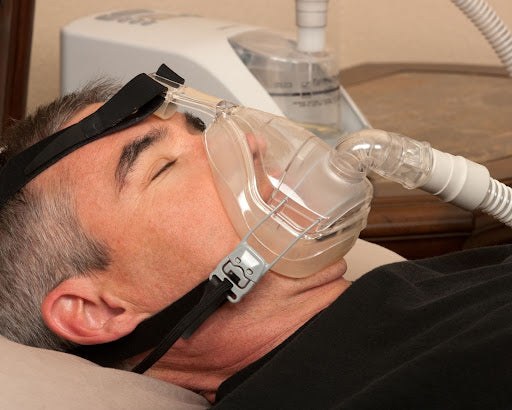If you have obstructive sleep apnea, you may use a continuous positive airway pressure (CPAP) machine to help you sleep more soundly through the night. For most sleep apnea patients, CPAP therapy is likely going to be the recommended treatment by your doctor because it can help deliver the necessary air to your lungs in a continuous manner while you sleep.
But the constant air pressure in your airways can lead to discomfort, which may have you questioning if you should opt for a CPAP machine with a humidifier integrated into the device.
Follow along as ApneaMed shares the pros and cons of choosing CPAP equipment with a humidifier.
What Is a CPAP Humidifier?
A CPAP humidifier isn’t much different from your standard continuous positive airway pressure machine. It has an external or integrated humidifier that adds moisture to the pressurized air. With consistent use of a CPAP machine, it is common for individuals to feel discomfort — and because a standard humidifier only adds moisture to the room’s air, the individual is more likely to experience a dry mouth.
With a CPAP humidifier, the individual will have moisture added to the air they are breathing, hopefully reducing the discomfort they may otherwise experience.
Benefits of a CPAP Humidifier
If your CPAP machine causes you to suffer from dry mouth, you may want to look into a CPAP humidifier, which can help with dry mouth, runny or dry nose, chapped lips, and nose bleeding by adding additional moisture.
The most significant advantage of using a CPAP humidifier over a traditional CPAP machine is that it will provide relief from common side effects such as:
- Dry Mouth
- Sore Throat
- Inflammation of the Nasal Passage
- Congestion
- Irritation of the Airway
- Nosebleeds
Using a CPAP humidifier can help a patient sleep more soundly and minimize the adverse side effects of CPAP therapy.
Disadvantages of a CPAP Humidifier
While a CPAP humidifier can relieve typical CPAP side effects, it’s important to note that each patient will have different results. While a CPAP humidifier may alleviate some of these symptoms, it may not provide adequate relief for others — not making it worth the investment over traditional CPAP therapy.
A negative side effect of a CPAP humidifier that patients should be aware of is rainout. Rainout happens when heated air cools in your equipment’s tubing creating condensation, reaching your mask as water, leaving you with a damp face. This occurs because the air molecules carrying the moisture have cooled down past the dew point before reaching the CPAP mask, which raises the humidity of the air and reduces its ability to hold water.
Is Traditional CPAP or a CPAP Humidifier Right for Me?
Both traditional CPAP and CPAP humidifiers are great solutions for patients diagnosed with obstructive sleep apnea. While CPAP therapy is typically the first choice for most doctors, your sleep physician can help you determine if a CPAP humidifier will help minimize some of the adverse side effects you may be experiencing.
These breathing machine options can relieve symptoms for patients, allowing them to receive a deeper night’s sleep and function better throughout the day. The goal is to ensure you reap the most benefits from the PAP therapy. If you aren’t sure which type of PAP therapy is ideal for your situation, your doctor can help determine which treatment options align best with your specific type of sleep apnea.
Once you’ve decided which form of sleep apnea therapy to move forward with, ApneaMed can supply the breathing machine you need. Contact us to learn more about the breathing equipment we provide sleep apnea patients.

